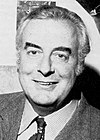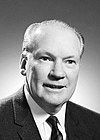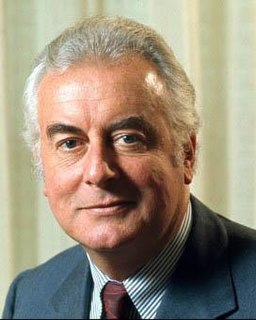
Edward Gough Whitlam was the 21st prime minister of Australia, serving from 1972 to 1975. The longest-serving leader of the Australian Labor Party (ALP), he was removed as prime minister after controversially being dismissed by the governor-general of Australia, Sir John Kerr, at the climax of the 1975 Australian constitutional crisis. Whitlam is the only Australian prime minister to have been removed from office in this manner.

Francis Daniel Crean was an Australian politician who served as a member of the House of Representatives from 1951 to 1977, representing the Labor Party. He was a minister in the Whitlam Government, including as Treasurer from 1972 to 1974 and Deputy Prime Minister for a few months in 1975.

Sir Billy Mackie Snedden, was an Australian politician who served as the leader of the Liberal Party from 1972 to 1975. He was also a cabinet minister from 1964 to 1972, and Speaker of the House of Representatives from 1976 to 1983.
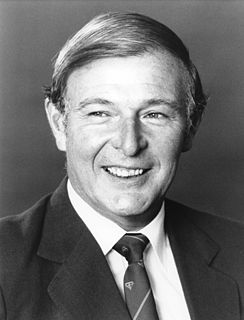
John Douglas Anthony, was an Australian politician. He served as leader of the National Party of Australia from 1971 to 1984 and was the second and longest-serving Deputy Prime Minister, holding the position under John Gorton (1971), William McMahon (1971–1972) and Malcolm Fraser (1975–1983).
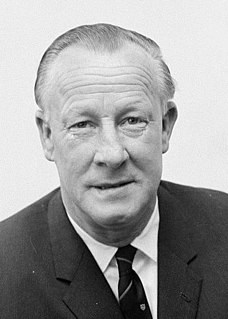
Lance Herbert Barnard AO was an Australian politician and diplomat. He was the deputy leader of the Australian Labor Party (ALP) from 1967 to 1974 and held senior ministerial office in the Whitlam Government, most notably as Deputy Prime Minister of Australia from 1972 to 1974.
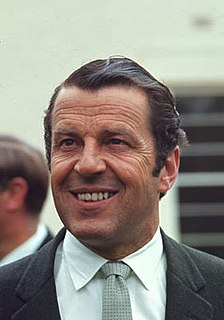
Donald Leslie Chipp, AO was an Australian politician who was the inaugural leader of the Australian Democrats, leading the party from 1977 to 1986. He began his career as a member of the Liberal Party, winning election to the House of Representatives in 1960 and serving as a government minister for a cumulative total of six years. Chipp left the Liberals in 1977 and was soon persuaded to lead a new party, the Democrats who, he famously proclaimed in 1980, would "keep the bastards honest". He was elected to the Senate on 10 December 1977 and led the party at four federal elections. From 1983 it held the sole balance of power in the Senate.
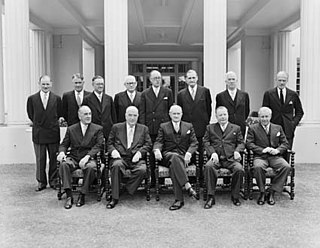
The Seventh Menzies Ministry was the 37th ministry of the Government of Australia. It was led by the country's 12th Prime Minister, Robert Menzies. The Seventh Menzies Ministry succeeded the Sixth Menzies Ministry, which dissolved on 11 January 1956 following the federal election that took place in the previous December. It is the first ministry to consist of a two-tier ministry, with only senior ministers being members of Cabinet, while the other ministers are in the outer ministry. With the exception of the Whitlam Government and the caretaker First Fraser Ministry, this practice has endured to this day. The ministry was replaced by the Eighth Menzies Ministry on 10 December 1958 following the 1958 federal election.
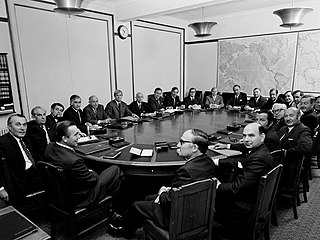
The McMahon Ministry was the 46th ministry of the Government of Australia. It was led by the country's 20th Prime Minister, William McMahon. The McMahon Ministry succeeded the Second Gorton Ministry, which dissolved on 10 March 1971 following the resignation of John Gorton as Prime Minister. The ministry was replaced by the First Whitlam Ministry on 5 December 1972 following the federal election that took place on 2 December which saw Labor defeat the Coalition.
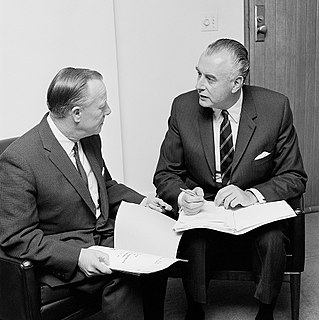
The First Whitlam Ministry (Labor) was the 47th ministry of the Government of Australia. Often known as the "two-man Ministry" or the "Duumvirate", it was led by the country's 21st Prime Minister, Gough Whitlam. The First Whitlam Ministry succeeded the McMahon Ministry, which dissolved on 5 December 1972 following the federal election that took place on 2 December which saw Labor defeat William McMahon's Liberal–Country Coalition. The ministry was replaced by the Second Whitlam Ministry on 19 December 1972.
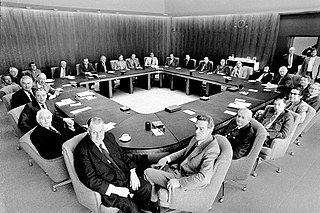
The Third Whitlam Ministry (Labor) was the 49th ministry of the Government of Australia. It was led by the country's 21st Prime Minister, Gough Whitlam. The Third Whitlam Ministry succeeded the Second Whitlam Ministry, which dissolved on 12 June 1974 following the federal election that took place in May. The ministry was replaced by the First Fraser Ministry on 11 November following the dismissal of the Whitlam Government by Governor-General Sir John Kerr.
The First Fraser Ministry was the 50th ministry of the Government of Australia. It was led by the country's 22nd Prime Minister, Malcolm Fraser. The First Fraser Ministry succeeded the Third Whitlam Ministry, which dissolved on 11 November following the dismissal of the Whitlam Government by Governor-General Sir John Kerr. As such, it was a caretaker ministry until a federal election could take place. To date, it is the last ministry not to be split between a Cabinet and outer ministry. In the event, the Coalition was ultimately elected on 13 December 1975, and this ministry was replaced by the Second Fraser Ministry on 22 December 1975.

The Whitlam Government was the federal executive government of Australia led by Prime Minister Gough Whitlam of the Australian Labor Party. The government commenced when Labor defeated the McMahon Government at the 1972 federal election, ending a record 23 years of continuous Coalition government. It was terminated by Governor-General Sir John Kerr following the 1975 constitutional crisis and was succeeded by the Fraser Government—the sole occasion in Australian history when an elected federal government was dismissed by the head of state.

Charles Keith Jones AO was an Australian politician and government minister.

The 1977 Australian federal election was held in Australia on 10 December 1977. All 124 seats in the House of Representatives and 34 of the 64 seats in the Senate were up for election.

The 1974 Australian federal election was held in Australia on 18 May 1974. All 127 seats in the House of Representatives and all 60 seats in the Senate were up for election, due to a double dissolution. The incumbent Labor Party led by Prime Minister Gough Whitlam defeated the opposition Liberal–Country coalition led by Billy Snedden. This marked the first time that a Labor leader won two consecutive elections.

The 1972 Australian federal election was held in Australia on 2 December 1972. All 125 seats in the House of Representatives were up for election, as well as a single Senate seat in Queensland. The incumbent Liberal–Country coalition government, led by Prime Minister William McMahon, was defeated by the opposition Labor Party led by Gough Whitlam. Labor's victory ended 23 years of successive Coalition governments that began in 1949 and started the three-year Whitlam Labor Government.

Manfred Douglas Cross is a retired Australian politician. He was educated at various state schools in Brisbane in Queensland before joining the Queensland public service and later, in 1961, becoming a member of the Australian parliament. Along with Bill Hayden and Doug McClelland, Cross is the earliest elected Labor MP still alive.

Elections were held in the state of Western Australia on 30 March 1974 to elect all 51 members to the Legislative Assembly and 15 members to the 30-seat Legislative Council. The one-term Labor government, led by Premier John Tonkin, was defeated by the Liberal Party, led by Opposition Leader Charles Court.

The McMahon Government was the period of federal executive government of Australia led by Prime Minister William McMahon of the Liberal Party. It was made up of members of a coalition between the Liberal Party and the Country Party, led by Doug Anthony as Deputy Prime Minister. The McMahon Government lasted from March 1971 to December 1972, being defeated at the 1972 federal election. Writing for the Australian Dictionary of Biography, Julian Leeser describes McMahon's prime ministership as "a blend of cautious innovation and fundamental orthodoxy".
The Lewis–Cutler ministry or First Lewis ministry was the 68th ministry of the New South Wales Government, and was led by the 33rd Premier, Tom Lewis, of the Liberal Party in coalition with the Country Party, led by Sir Charles Cutler. It was the first of two occasions when Lewis was Premier; and the seventh and final occasion when Cutler served as Deputy Premier.

